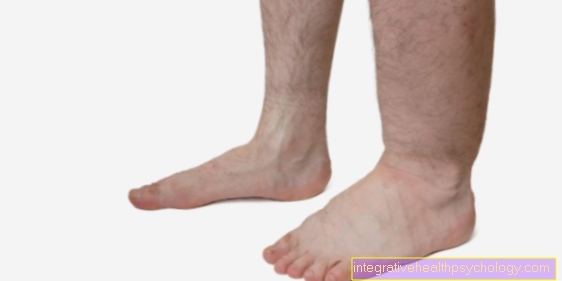Duration of a pinched nerve
introduction
How long the complaints last with a pinched nerve can usually not be assessed across the board, as the duration depends on many factors.
On the one hand, the cause of the entrapment plays a role (tension in the back muscles, sudden movement, blocked vertebral joint, trauma / accident), and on the other hand, the duration also depends on how much the person concerned does to get rid of the symptoms.
Also read: Pinched nerve

Average duration
A pinched nerve is divided into two types: acute pinching with the resulting pain and chronic back pain caused by a pinched nerve.
In the acute forms, a jerky movement is usually the trigger for the symptoms. This creates a blockage in a vertebral joint and pinches the nerve. The result is sudden severe pain. With an adequate treatment, in which the blockage is released again, the symptoms can be eliminated very quickly. The symptoms usually disappear a few days after treatment.
On the other hand, it looks completely different with the chronified form. The fault is a formerly trapped nerve, in which the symptoms could not be compensated for due to poor posture and weak back muscles. The course can go on for several months to years and the symptoms return even after pain-free intervals. The nerve often occupies those affected for a lifetime, unless adequate and permanent strengthening of the back muscles is achieved.
You might also be interested in: Nerve congestion syndrome
Duration at different locations
Pinched nerve in the back
A pinched nerve in the back is usually caused by a sudden movement that triggers a blockage in the spine. This blockage can usually be removed quickly.
Then the back muscles must be treated. Anyone who works consistently to strengthen the back muscles will usually get rid of the symptoms after a few days and can permanently prevent recurrence. If the muscles are not sufficiently strengthened, the pain is likely to become chronic, so that a duration of months to years must be expected.
You might also be interested in:
- Therapy of back pain
- Lumbar spine syndrome
Appointment with a back specialist?

I would be happy to advise you!
Who am I?
My name is dr. Nicolas Gumpert. I am a specialist in orthopedics and the founder of .
Various television programs and print media report regularly about my work.On HR television you can see me every 6 weeks live on "Hallo Hessen".
But now enough is indicated ;-)
The spine is difficult to treat. On the one hand it is exposed to high mechanical loads, on the other hand it has great mobility.
The treatment of the spine (e.g. herniated disc, facet syndrome, foramen stenosis, etc.) therefore requires a lot of experience.
I focus on a wide variety of diseases of the spine.
The aim of any treatment is treatment without surgery.
Which therapy achieves the best results in the long term can only be determined after looking at all of the information (Examination, X-ray, ultrasound, MRI, etc.) be assessed.
You can find me in:
- Lumedis - your orthopedic surgeon
Kaiserstrasse 14
60311 Frankfurt am Main
Directly to the online appointment arrangement
Unfortunately, it is currently only possible to make an appointment with private health insurers. I hope for your understanding!
Further information about myself can be found at Dr. Nicolas Gumpert
Pinched nerve in the neck
A pinched nerve that only occurs in the neck is a typical consequence of a traffic accident with whiplash. The entire force transmission of the collision takes place on the neck and can trigger a shift of the vertebral bones against each other, whereby a nerve is pinched.
This shift can usually be corrected again with simple hand movements. The neck pain, which is caused by reflex tension in the neck muscles, then persists for a few days. In the case of more severe courses, in which there is structural damage to the cervical spine, the spinal cord or the nerves branching out from it, the course can be significantly longer.
Additional information here:
- Neck pain
- Cervical spine syndrome
Pinched nerve in the shoulder
The pinched nerve on the shoulder blade is similar in shape to a pinched nerve on the back. With targeted back exercises, the duration can be limited to a few days or weeks. However, it can become chronic if the back muscles are not sufficiently strengthened.
On the shoulder itself there is also the so-called impingement syndrome: It is not a nerve but a muscle tendon with the associated nerves that is pinched on the shoulder roof as soon as the affected arm is spread outwards. This impingement syndrome usually has a protracted course.
For more information, also read: Pinched nerve on shoulder
Pinched nerve on the ribs
A pinched nerve on the ribs is typically caused by coughing or sneezing. Since the cause of the discomfort is sudden movement, the discomfort usually does not last particularly long.
The entrapment can usually be reversed by targeted stretching of the chest. The nerve is then irritated for a few days, but the symptoms usually subside within a week. However, there is a risk that coughing or sneezing will cause the entrapment again.
Also interesting:
- Rib Block - How Can You Solve It?
- Pinched nerve on the rib
How can you shorten the duration?
The duration of a pinched nerve can usually be little influenced. However, you can work specifically to keep the following pain as short as possible.
As a rule, weakened muscles in the back are the fundamental cause of a pinched nerve, as this prevents the spine from being adequately stabilized and even small movements can cause pinching. In addition, the pain of the pinched nerve leads to tension in the back muscles. This leads to a vicious circle that has to be broken so that the pain disappears as quickly as possible. First of all, heat applications and massages are the means of choice to relax tense muscles. So if you take it easy for a few days and put a heat pad on your back, you can accelerate this relaxation process.
After this short relaxation phase comes the most important component of the therapy: the targeted build-up of the back muscles. At the beginning, trained therapists should ensure that the back exercises are performed correctly. The decisive factor for the duration of the illness, however, is the regularity of the independent performance of the exercises. In the long term, this can also prevent trapping again.
You might also be interested in: physiotherapy
That's how long you are on sick leave
The length of the sick leave depends on the cause of the symptoms. If a sudden blockage occurs in the vertebral joint, the cause can usually be eliminated quickly. A week's sick leave is usually sufficient.
If, on the other hand, a herniated disc is the cause of the pain, those affected are initially also written off sick for a week, but there is rarely a quick improvement, so that further sick notes follow. The total duration is usually one to two months. In severe cases, the duration can extend to several years.















.jpg)













